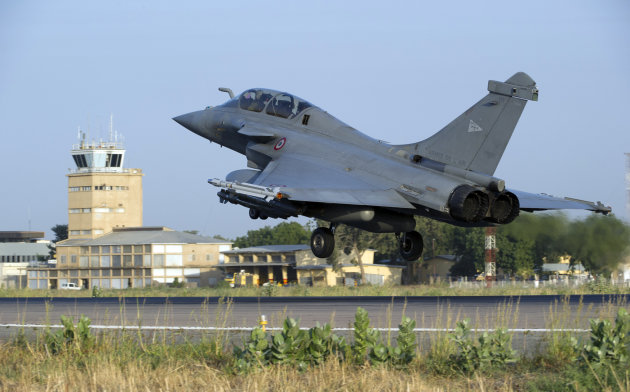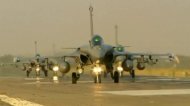By Scott Stewart
Vice President of Analysis
Vice President of Analysis
The French military's current campaign to dislodge jihadist militants from northern Mali and the recent high-profile attack against a natural gas facility in Algeria are both directly linked to the foreign intervention in Libya that overthrew the Gadhafi regime. There is also a strong connection between these events and foreign powers' decision not to intervene in Mali when the military conducted a coup in March 2012. The coup occurred as thousands of heavily armed Tuareg tribesmen were returning home to northern Mali after serving in Moammar Gadhafi's military, and the confluence of these events resulted in an implosion of the Malian military and a power vacuum in the north. Al Qaeda in the Islamic Maghreb and other jihadists were able to take advantage of this situation to seize power in the northern part of the African nation.
As all these events transpire in northern Africa, another type of foreign intervention is occurring in Syria. Instead of direct foreign military intervention, like that taken against the Gadhafi regime in Libya in 2011, or the lack of intervention seen in Mali in March 2012, the West -- and its Middle Eastern partners -- have pursued a middle-ground approach in Syria. That is, these powers are providing logistical aid to the various Syrian rebel factions but are not intervening directly.
Just as there were repercussions for the decisions to conduct a direct intervention in Libya and not to intervene in Mali, there will be repercussions for the partial intervention approach in Syria. Those consequences are becoming more apparent as the crisis drags on.
Intervention in Syria
For more than a year now, countries such as the United States, Turkey, Saudi Arabia, Qatar and European states have been providing aid to the Syrian rebels. Much of this aid has been in the form of humanitarian assistance, providing things such as shelter, food and medical care for refugees. Other aid has helped provide the rebels with non-lethal military supplies such as radios and ballistic vests. But a review of the weapons spotted on the battlefield reveals that the rebels are also receiving an increasing number of lethal supplies.
Visit our Syria page for related analysis, videos, situation reports and maps.
For example, there have been numerous videos released showing Syrian rebels using weapons such as the M79 Osa rocket launcher, the RPG-22, the M-60 recoilless rifle and the RBG-6 multiple grenade launcher. The Syrian government has also released videos of these weapons after seizing them in arms caches. What is so interesting about these weapons is that they were not in the Syrian military's inventory prior to the crisis, and they all likely were purchased from Croatia. We have also seen many reports and photos of Syrian rebels carrying Austrian Steyr Aug rifles, and the Swiss government has complained that Swiss-made hand grenades sold to the United Arab Emirates are making their way to the Syrian rebels.
With the Syrian rebel groups using predominantly second-hand weapons from the region, weapons captured from the regime, or an assortment of odd ordnance they have manufactured themselves, the appearance and spread of these exogenous weapons in rebel arsenals over the past several months is at first glance evidence of external arms supply. The appearance of a single Steyr Aug or RBG-6 on the battlefield could be an interesting anomaly, but the variety and concentration of these weapons seen in Syria are well beyond the point where they could be considered coincidental.
This means that the current level of external intervention in Syria is similar to the level exercised against the Soviet Union and its communist proxies following the Soviet intervention in Afghanistan. The external supporters are providing not only training, intelligence and assistance, but also weapons -- exogenous weapons that make the external provision of weapons obvious to the world. It is also interesting that in Syria, like Afghanistan, two of the major external supporters are Washington and Riyadh -- though in Syria they are joined by regional powers such as Turkey, Jordan, Qatar and the United Arab Emirates, rather than Pakistan.
In Afghanistan, the Saudis and the Americans allowed their partners in Pakistan's Inter-Services Intelligence agency to determine which of the myriad militant groups in Afghanistan received the bulk of the funds and weapons they were providing. This resulted in two things. First, the Pakistanis funded and armed groups that they thought they could best use as surrogates in Afghanistan after the Soviet withdrawal. Second, they pragmatically tended to funnel cash and weapons to the groups that were the most successful on the battlefield -- groups such as those led by Gulbuddin Hekmatyar and Jalaluddin Haqqani, whose effectiveness on the battlefield was tied directly to their zealous theology that made waging jihad against the infidels a religious duty and death during such a struggle the ultimate accomplishment.
A similar process has been taking place for nearly two years in Syria. The opposition groups that have been the most effective on the battlefield have tended to be the jihadist-oriented groups such as Jabhat al-Nusra. Not surprisingly, one reason for their effectiveness was the skills and tactics they learned fighting the coalition forces in Iraq. Yet despite this, the Saudis -- along with the Qataris and the Emiratis -- have been arming and funding the jihadist groups in large part because of their success on the battlefield. As my colleague Kamran Bokhari noted in February 2012, the situation in Syria was providing an opportunity for jihadists, even without external support. In the fractured landscape of the Syrian opposition, the unity of purpose and battlefield effectiveness of the jihadists was in itself enough to ensure that these groups attracted a large number of new recruits.
But that is not the only factor conducive to the radicalization of Syrian rebels. First, war -- and particularly a brutal, drawn-out war -- tends to make extremists out of the fighters involved in it. Think Stalingrad, the Cold War struggles in Central America or the ethnic cleansing in the Balkans following the dissolution of Yugoslavia; this degree of struggle and suffering tends to make even non-ideological people ideological. In Syria, we have seen many secular Muslims become stringent jihadists. Second, the lack of hope for an intervention by the West removed any impetus for maintaining a secular narrative. Many fighters who had pinned their hopes on NATO were greatly disappointed and angered that their suffering was ignored. It is not unusual for Syrian fighters to say something akin to, "What has the West done for us? We now have only God."
When these ideological factors were combined with the infusion of money and arms that has been channeled to jihadist groups in Syria over the past year, the growth of Syrian jihadist groups accelerated dramatically. Not only are they a factor on the battlefield today, but they also will be a force to be reckoned with in the future.
The Saudi Gambit
Despite the jihadist blowback the Saudis experienced after the end of the war against the Soviets in Afghanistan -- and the current object lesson of the jihadists Syria sent to fight U.S. forces in Iraq now leading groups such as Jabhat al-Nusra -- the Saudi government has apparently calculated that its use of jihadist proxies in Syria is worth the inherent risk.
There are some immediate benefits for Riyadh. First, the Saudis hope to be able to break the arc of Shiite influence that reaches from Iran through Iraq and Syria to Lebanon. Having lost the Sunni counterweight to Iranian power in the region with the fall of Saddam Hussein in Iraq and the installation of a Shiite-led government friendly to Iran, the Saudis view the possibility of installing a friendly Sunni regime in Syria as a dramatic improvement to their national security.
Supporting the jihad in Syria as a weapon against Iranian influence also gives the Saudis a chance to burnish their Islamic credentials internally in an effort to help stave off criticism that they are too secular and Westernized. It allows the Saudi regime the opportunity to show that it is helping Muslims under assault by the vicious Syrian regime.
Supporting jihadists in Syria also gives the Saudis an opportunity to ship their own radicals to Syria, where they can fight and possibly die. With a large number of unemployed, underemployed and radicalized young men, the jihad in Syria provides a pressure valve similar to the past struggles in Iraq, Chechnya, Bosnia and Afghanistan. The Saudis are not only trying to winnow down their own troubled youth; we have received reports from a credible source that the Saudis are also facilitating the travel of Yemeni men to training camps in Turkey, where they are trained and equipped before being sent to Syria to fight. The reports also indicate that the young men are traveling for free and receiving a stipend for their service. These young radicals from Saudi Arabia and Yemen will even further strengthen the jihadist groups in Syria by providing them with fresh troops.
The Saudis are gaining temporary domestic benefits from supporting jihad in Syria, but the conflict will not last forever, nor will it result in the deaths of all the young men who go there to fight. This means that someday the men who survive will come back home, and through the process we refer to as "tactical Darwinism" the inept fighters will have been weeded out, leaving a core of competent militants that the Saudis will have to deal with.
But the problems posed by jihadist proxies in Syria will have effects beyond the House of Saud. The Syrian jihadists will pose a threat to the stability of Syria in much the same way the Afghan groups did in the civil war they launched for control of Afghanistan after the fall of the Najibullah regime. Indeed, the violence in Afghanistan got worse after Najibullah's fall in 1992, and the suffering endured by Afghan civilians in particular was egregious.
Now we are seeing that the jihadist militants in Libya pose a threat not only to the Libyan regime -- there are serious problems in eastern Libya -- but also to foreign interests in the country, as seen in the attack on the British ambassador and the U.S. diplomatic mission in Benghazi. Moreover, the events in Mali and Algeria in recent months show that Libya-based militants and the weapons they possess also pose a regional threat. Similar long-lasting and wide-ranging repercussions can be expected to flow from the intervention in Syria.
Read more: The Consequences of Intervening in Syria | Stratfor


